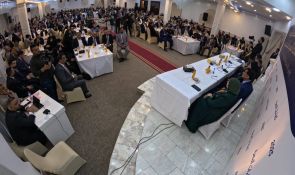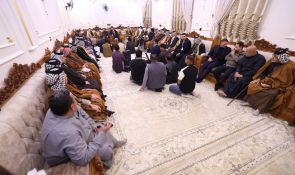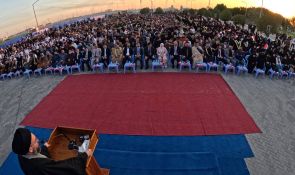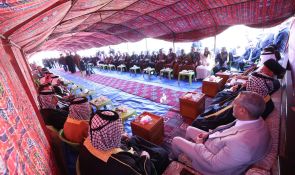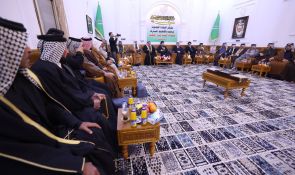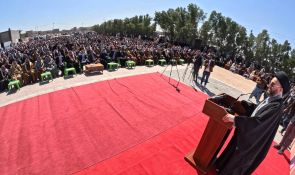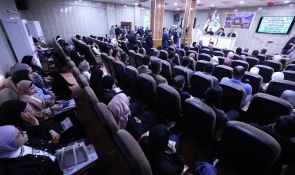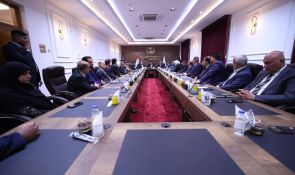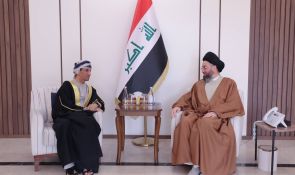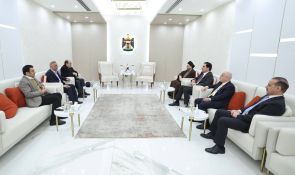In an Interview with Al-Monitor Website, Sayyid Ammar Al Hakim: The Citizen Bloc Possesses the Credibility and is a Bridge that Connects Everyone
Sayyid Ammar al-Hakim, head of the Islamic Supreme Council of Iraq, put forth his vision for the political situation in Iraq and the accumulated crises. In an interview with Al-Monitor, he said that some crises such as the Anbar crisis cannot be solved by security means. He warned against the politicization of the army, and stressed that his electoral bloc possessed the most important card, namely the "credibility" card.
Al Hakim: The root of the crisis in Iraq is represented by the absence of a unified understanding for building the new Iraqi state. Some seek to build the state on a centralized basis, while others seek to build it on the basis of a confederation and go beyond the framework of a federation. And some seek to make it a state of sects and nationalities. This is the main cause of the crisis. Each party's understanding of the state is reflected in its actions and behavior. In addition, the deficiency or vagueness in some of the constitutional mechanisms has opened the door wide for circumventing the constitution through individual efforts. Finally, many parties and political currents lack maturity when it comes to political experience. All of these factors put Iraq on course for a continuing crisis, but in our assessment, the basis of the crisis is the lack of a unified understanding regarding the new Iraqi state.
Al Hakim: The defect was in form, not in substance. We moved from an environment of opposition to an environment of a state, and that transition requires a change of mechanisms and a renewal of concepts, and this was done in stages. First, we changed the name; from the Supreme Council for the Islamic Revolution to the Islamic Supreme Council. Then we changed mechanisms and put in place a new system, and focused our project on the state and our perception of democracy. We believe that change is a necessity of life, and that successful political work is work that aspires to the future, benefits from the experiences of the past, and interacts with the present. We are still looking forward to the completion of the renovation process, opening our doors to young blood and integrating more and more with our people in different social classes. We fought against dictatorship fiercely, and now we are working strongly in order to build a modern, just and powerful state. And this requires that we constantly develop our performance, renew our mechanisms and change for the better.
Al Hakim: Moderation is not a position, but rather a policy and an approach. This approach is not a spur of the moment [decision] or the product of the current circumstances. Rather, it is the approach of our political current, of the Supreme Council, and of all our leaders who have moved forward with this approach, beginning with leader of the Ummah Ayatollah Muhsin al-Hakim, and then Ayatollah Mohammad Baqir al-Hakim and the late Abdul Aziz al-Hakim. Today, we are committed to this approach, and experience has proven that it is the correct approach. I am confident that if we adopted this approach in rule now, we would be able to solve a lot of problems and overcome many crises. This is because crises are born out of stubbornness in positions and intransigence in opinion. When you are ready to meet the other in the middle of the road, this means that you have completed half the path to solving the problem and avoiding crisis.
Al Hakim: The crisis in Anbar will end when what we stressed in our initiative "Our Resisting Anbar” is adopted. We believe that "fabricated" crises cannot be solved with security solutions. The problem in Anbar is "fabricated", and its solution must comprise security, political, social and service-based solutions. Terrorism grows when the political atmosphere is paralyzed, and we have to differentiate between confronting terrorism in Anbar and solving the political problems in Anbar.
Al Hakim: We will continue to strongly warn about the issue of the politicization of the army, because we believe in building a state based on institutions. And the military institution, in democratic systems, must be neutral and independent. Therefore we will not allow for the politicization of the army, destroying its creed or weakening it.
Al Hakim: We have directly declared our position and we addressed Mr. Sadr, calling on him to reconsider his decision, if possible. This is because we believe that Mr. Sadr has widespread support and many followers, and the Sadr family is highly respected in Iraqi society. While we respect his personal decision, we hope that his eminence will reconsider this decision.
Al Hakim: Religion is a supreme spiritual and moral value in all societies, and in Iraqi society in particular. In Iraq, religion is part of the general culture of society. We have our own opinion about the relationship between religion and politics, but I do not have sufficient space here to clarify this important and sensitive relationship. In short, our vision for building a state focuses on the project to build a modern and just state. Justice is a supreme religious value, not a political value. Politics gives us the means, and religious gives us the values. The more correct question relates to the difference between a religious state and a civil state, yet we removed ourselves from this framework of civil versus religious state by proposing the concept a modern and just state, in accordance with the principles of the constitution.
Al Hakim: The crises of a big country like Iraq cannot be reduced to one single issue or one case. Likewise, one cannot neglect the possibility that crises overlap with one another as a result of a specific approach. I believe that Iraq's greatest challenge is the lack of a common understanding of the concept of a new Iraqi state. And one of the most important pillars of this state is the principle of peaceful transfer of power. At the constitutional level, there is no objection to Mr. Maliki assuming a third term. The important thing is for there to be a single vision, a clear project, and a unified group working in harmony for the future of Iraq. This is the basis, and if this basis is not available there will not be an agreement on a third term for Mr. Maliki.
Al Hakim: It is certain that the lack of commitment to a common understanding of the concept of a new Iraqi state means that trends are different and sometimes intersecting. We cannot limit the problem to merely two parties: those with and those against Maliki, or a centralized state and a decentralized state. The problem is multifaceted and has multiple parties. There are those who call for centralization, those who call for federalism, and those who call for a confederation. And some may be working on achieving division, even if not openly. The constitution specifies the federal identity of the state, but the procedures are not clear and the political parties do not agree on specific action.
Al Hakim: The political map is drawn by the elections, and the Citizen Bloc has great ambitions to take its natural position and its popular entitlements. We have the most important cards on the national scene, namely the card of "credibility". Our honest relations with everyone have given us a lot of credibility. Our policies are established, not volatile, and this is an important factor in determining the extent of influence in the next stage. Iraq is a pluralistic democracy, and whoever has their doors open to all has a role in bringing together a unified team at a single table. And we hope that we can be a bridge that connects everyone. Our confidence in ourselves, and in our people, is high.


